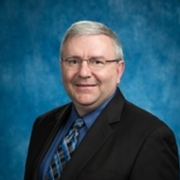Thomas Guinn, Professor and Meteorology Program Coordinator, Embry-Riddle Aeronautical University

Please include details about your educational background and what sparked your interest in atmospheric or related sciences.
I grew up in a small Iowa town, and always had a love of science. My favorite day in school was always any day the teacher would do a science experiment in class. As I grew older, I also became very interested in large and small group speech contests. Then one day, while attending the Iowa State Fair, I met Mike Lazono, a Des Moines area broadcast meteorologist. It suddenly hit me that through meteorology I could combine my passions for speech and science. Upon graduation, I decided to go the Iowa State University for meteorology intent on broadcasting. Like many people, my plans changed. I found I loved meteorology, but not so much broadcasting. In a freshman careers class, an Air Force meteorologist came to talk about his job, and it changed my trajectory completely. I applied for and received an ROTC scholarship for my remaining three years of college. Once in the Air Force, I was offered the opportunity to attend graduate school at Colorado State University for my M.S. and Ph.D., while still on active duty. After 22 years in the Air Force, I then started a completely new career by returning to academia as an assistant professor of meteorology at Embry-Riddle Aeronautical University.
What was your first job in the field and how did you end up in the job you are in now?
My first job was as second lieutenant weather officer in the Air Force. I was responsible for managing the software to process polar-orbiting visible and infrared satellite data and save to a database. Although I was in the meteorology career field, my first job title was actually "computer systems analyst." However, the coding I would learn in that job would eventually become extremely useful in graduate school. You really never know what skills will change or benefit your career path.
What opportunities did you pursue that you knew would be beneficial to securing a job in the profession?
From the early days of my undergraduate degree, I knew I wanted to pursue a Ph.D. in meteorology. Although my reasoning at the time was somewhat misguided (I assumed I would somehow know all there is to know about meteorology), it provided an ideal goal for me to pursue and kept me focused.
What other courses/skills beyond the required math and science courses do you think would be the most helpful to individuals wanting a career in your profession?
Whether it's the Air Force or academia, writing and speaking skills are likely the two most beneficial and transferable skills you can have. Any classes that teach you to write or to give talks is a beneficial class.
What is your typical day on the job like?
I think most people are familiar with what a professor does on a day-to-day basis. Like other faculty, I prepare my lectures, work on research, and advise students. As the program coordinator, I also have responsibility for managing the curriculum and developing the teaching schedules.
What do you like most about your job? What is the most challenging thing about your job?
The absolute best part of my job is working with and mentoring our undergraduate students. Watching them grow and learn while knowing you were a small part of it all is such a joy. I also love being able to conduct research, whether it's for a course or for publication. Learning and discovering keeps us all young.
Does your job allow for a good work/life balance? If not, why?
Like all jobs, work-life balance is a challenge. Most meteorologists are very passionate about their jobs. No one ever goes into meteorology because they couldn't think of anything better to do. And when you love your job, it's easy to become absorbed in it. You just need to remind yourself frequently to step back, be in the moment, and take care of family.
Over the course of your career what is the most exciting thing that has happened to you?
I have been so lucky, it's nearly impossible to name just one. The military allowed me the opportunity to travel the globe with my family and meet so many fascinating people. I will admit, though, living in Hawaii was definitely a highlight for me and my family.
Is there anything you wish you had done differently in your career?
Not at all.
What are some ‘must haves’’ on a resume if a person wants to gain employment in your field?
For academia, especially at a four-year institution, you must have a passion for teaching and desire to connect with students. I always look for faculty who have demonstrated exceptional performance in the classroom as well as in their research.